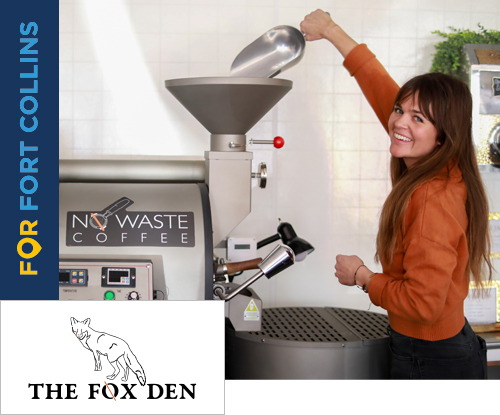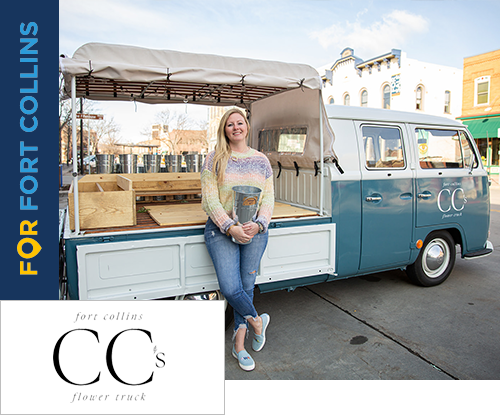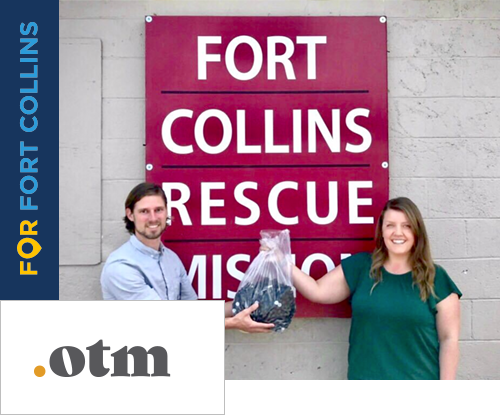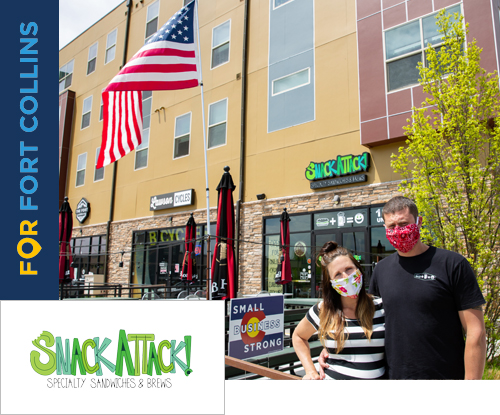Be sure to follow The Fox Den: No Waste Café & Roastery on Facebook and Instagram
Owner: Patricia Acheson
Great coffee shouldn’t come at the expense of the planet. Fox Den Cafe sources, roasts, brews, and serves coffee with the environment in mind. Patricia’s goal is to offer her customers a delicious and authentic coffee experience while promoting a no-waste culture in our community. They are committed to reducing their environmental impact by eliminating single-use disposables like to-go cups and napkins. Instead, The Fox Den encourages customers to bring their own reusable containers or use their mugs. Additionally, they compost their leftover food and donate it to nearby farms so they can use to build healthier soil and improve their plant growth.
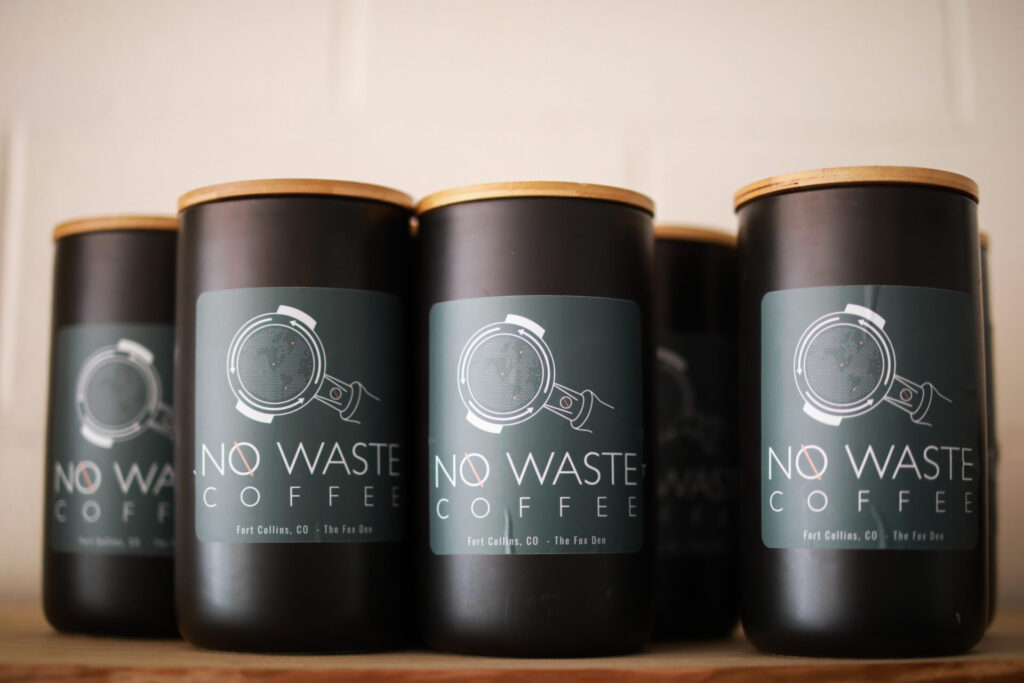
Once the beans arrive, Patricia roasts them on-site, creating a delicious, authentic flavor that keeps customers coming back for more. Make sure to stop by and also check out the space she offers for vendors whose products aligns with their sustainable no waste initiatives, allowing them to showcase their products and promote a more sustainable community.
Here is an interview with Patricia Acheson, owner of The Fox Den: No Waste Cafe & Roastery
1. How did you get into the coffee industry?
It wasn’t until I was about 25 when I started to learn about the amazing world of coffee and all the people involved in making sure you get your morning cup a’ joe. I was working a tech job in San Francisco that I really didn’t enjoy, so I picked up a bartending job one night a week to network with people in the financial district. Then, I met the bar’s Master Coffee Roaster. He would deliver coffee to the bar once a week that just happened to be the day and time of my shift. Over the course of 3-4 months he would sit at the bar with me, we’d drink coffee, and he would teach me everything he knew about the coffee industry. He told me stories about life growing up on coffee farms, he taught me the entire farm to cup process, he shared stories about roasting coffee with Alfred Pete, and Erna Knutsen, the creator of specialty coffee. He was an endless book of knowledge and it was absolutely fascinating, but I remember feeling very disappointed. I was thinking “How am I 25 years old, I’ve been drinking coffee since I was 8 years old, and never knew where coffee came from?” I started to ask my friends, co-workers, and my family if they knew where coffee came from, and not one of them knew the right answer. This realization is what really got me into coffee. I felt that this incredible world of coffee (especially the farmers) are so undervalued and under appreciated and I wanted to help spread the knowledge while also crafting new blends. Then after studying it more and learning how to roast, I kind of just fell in love with the overall industry and never left it’s side since then.
2. Who is a female role model that inspires you?
My mother, Clare Fox Acheson.
Growing up, her parents owned a stained glass window company, called Fox Studios in Indianapolis. When my mom was about 21 years old, her dad got very sick and could no longer run the shop. So my mom left Indiana State and went home to run the family business while taking classes at IUPUI to finish her degree. Not only did she step up, but she turned the company into one of the most reputable and successful stained glass companies in Indiana. She is now retired, but she and my father both worked full time while raising 6 kids. During my entire childhood I watched her successfully balance her work and her family life. She worked 5 days a week, sometimes 6, but somehow she never missed a volleyball game or a birthday party. She truly did it all, but I never appreciated it as much as I do now. Sure, she has taught me PLENTY about running a business and supported me every step of the way, but she has taught me way more than that. She inspires me because she was successful at her career, admired in our community, while always finding the time to put her family first. Whenever I find myself working 60-70 hour weeks I try to remind myself that time with my husband and my family is important, and if the shop isn’t perfect today, I always have tomorrow and I truly believe that she was/is so successful because she made time for that.
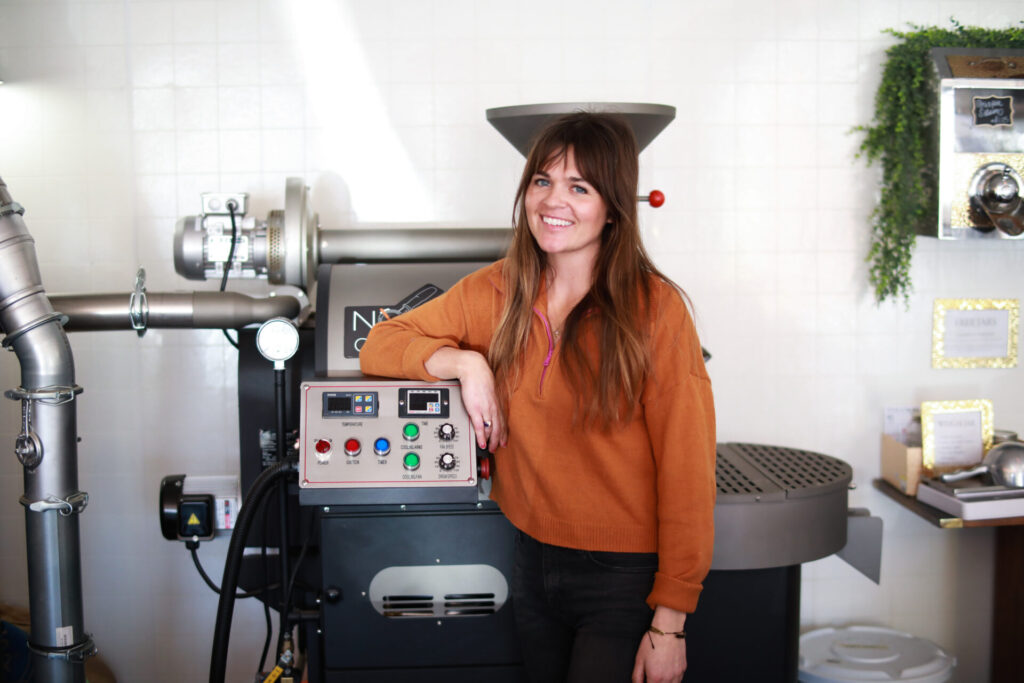
3. What is the best piece of advice you can give for an aspiring entrepreneur?
Don’t ask everyone for advice, just pick 3 core people. Choose 1 person who knows you well, 1 person who tells it to you straight and 1 successful person in your industry that you look up to. EVERYONE will give you advice on how to run your business successfully and it becomes very overwhelming and often misleading. Once you start asking every person for advice, you tend to shy away from what you wanted to do in the beginning. Then all the sudden you’re creating a company that is no longer “you”. I am not saying to not accept feedback. Feedback and advice are different. Feedback is a reaction/response to a process you have already put in place – this type of info is how you grow and stay current. Advice is a solution to that reaction/response and your solution speaks volumes to the type of person you are and company you are running, therefore, you want to be sure the advice you are taking aligns with you and your values.
4. Oftentimes it is thought that as an entrepreneur, business and personal life do not exist separately. How do the two affect one another and what is “balance” for you?
I think almost every entrepreneur is looking for a way to find that balance, including me. We continue to search for that balance because we know that it exists. While I am not perfect, I can at least share what I find to be helpful. I believe creating a business that attracts a community you want to be involved with is extremely important. Being an entrepreneur is a huge commitment and you should go into it knowing that for at least 2 years your life will evolve around your business. But, instead of just deciding to throw your personal life out the window, create a community within a community at your business. For example, we started open mic night every Thursday, and now it’s just like a big group of friends hanging out and playing music. I’m able to meet amazing people, create actual connections with them, while also helping my business succeed. Even if you don’t have a shop open to the public, you can do this by creating weekly networking events, an intramural volleyball team, or even a walking club sponsored by your business! The list goes on, you just have to think out of the box. Lastly, maintaining balance requires learning how to prioritize tasks. Choose 3 things you MUST get done for the day and remember that the rest can probably wait until tomorrow. So go home, have dinner with your partner, take your dog for a walk and give your mom a call.
5. If you could create one law that everyone in the world had to follow, what would it be?
This is easy. My law would require every individual, business, and government entity to take active steps towards reducing their carbon footprint, minimizing waste, and protecting our planet’s natural resources and there would be a nationwide Sustainable Auditing Company that would keep us accountable. Each household and business would be given a “carbon footprint goal” and then receive a monthly estimated “carbon footprint reading” that is calculated by the cars we drive, the amount of trash we accumulate, our water usage, and our electricity bill, etc. Then instead of fining people if they go over their goal, we would instead give them incentives when they go below or hit their calculated goal. It is proven that the average person responds better to positive reinforcement than a scare tactic.
Businesses would have to report how much waste they were accumulating and then have mandatory yearly check-ins by an auditor to make sure these numbers were accurate. These auditors would also make sure that what businesses advertise, is actually being practiced in their day to day operations. This would help put an end to greenwashing.
In my opinion enforcing a law like this, would not only add thousands of jobs to the workforce, but it would help keep us accountable and hopefully lead us to the realization that the less we waste, the more money we save, and a better environment we will create.
